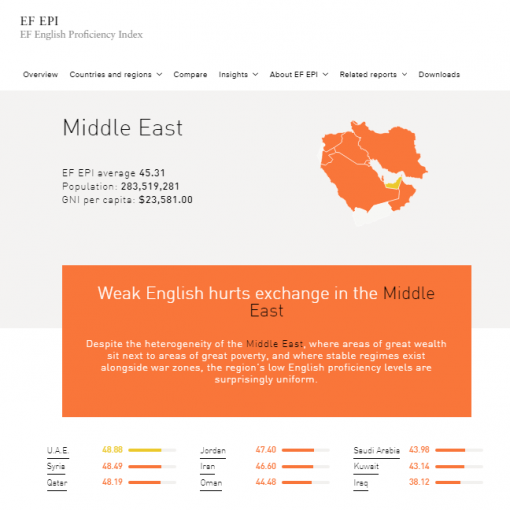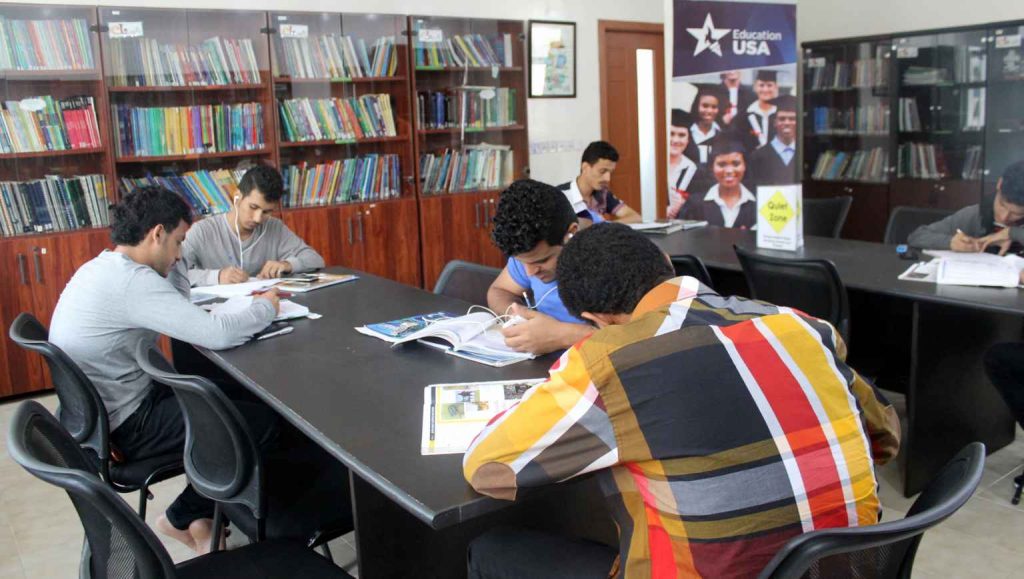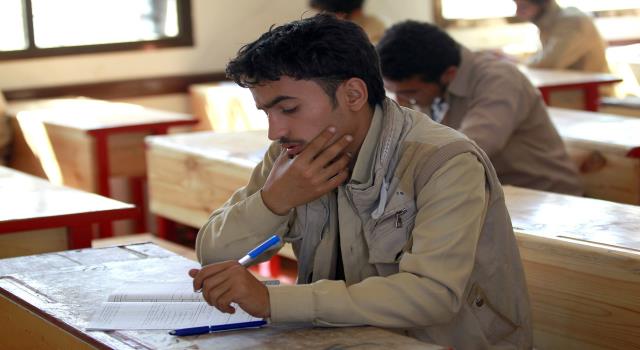The political and economic crisis since 2011 has caused a deterioration in Yemen's English language proficiency.
Most international educational institutions recognize both TOEFL and IELTS.
From my long experience, I find that girls are more persistent and determined than boys in mastering English.
Websites are a support for basic education in language institutes or English language educational institutions, not a substitute for them.
The interview was conducted by: Hassan Mohammed Al-Bayti
A 2015 report by the Education First Foundation showed that Yemen ranked 51st globally out of 70 countries, and second in the Arab world out of 12 countries in English proficiency. With the outbreak of the ongoing conflict in Yemen in the same year, the education system collapsed in general. Three years later, Yemen completely disappeared from the foundation's reports, replaced by Syria.
English is taught in Yemen through three sources: government educational institutions, private language institutes, and the internet. Private language institutes remain the strongest of these, given the support they receive from their administrators.
Government educational institutions, especially pre-university institutions, suffer from poor English language teaching by a large segment of teachers, both male and female, who are not fluent in the language, as the guest of the press interview pointed out.
Perhaps the reason behind the weakness of English language teaching in government educational institutions is the lack of government financial support, as stated by Eric Lawrie, Director of English at the British Council in the Middle East and North Africa.



Yemen is one of the countries that follows the British system for learning English. This goes back more than a century and a half, when southern Yemen was subject to British occupation in 1839 AD.
With the global conflict, which has reached the linguistic aspect, the United States of America has spread its wings over the Middle East in order to spread the English language according to its system. In Yemen, as one of the Middle Eastern countries, what is known as “AMIDEAST” was established. It is an institute funded by the US State Department through its embassies around the world. It began in Yemen in 1952 AD, where it began sending Yemeni students to study in the United States of America. Then the matter developed to open official offices in Sana’a in 1981 AD and Aden in 1998 AD. Their activity extended through these two centers in the most prominent Yemeni cities in the north, towards Taiz, and in the south, towards Mukalla.
Despite the presence of the British Council, which is supported by British embassies around the world, Yemen has not yet reached the desired level of English language proficiency, let alone the number of good speakers of the language, which reports show is predominantly female.
About this and more, I conducted Akabars Correspondence via the Facebook Messenger application with Dr. Shaza Bakir - a university lecturer at Hadhramout University, who is currently residing in the capital of Malaysia (Kuala Lumpur) to devote herself to her doctoral dissertation, and our guest is well known to the team Akabars While she was at the AMIDEAST Institute in Mukalla, eastern Yemen, between 2011 and 2013, she left the country for Malaysia after receiving a scholarship to complete her postgraduate studies there.
Dr. Shaza Bakir is a bilingual writer. She earned her BA in English from Hadhramout University in 2003 and pursued her MA in the United States through a Fulbright scholarship supported by the US State Department, where she earned her MA in English Literature from Appalachian State University in 2011.
She returned to Yemen as a teacher at AMIDEAST, where the journalist who interviewed her was a student between 2012 and 2013. She then left the country to join the National University of Malaysia (UKM) in 2013 to obtain a PhD in English by 2019.
In the correspondence we conducted with her, Dr. Bakir welcomed this dialogue, which is deeply concerned with teaching English in Yemen. She began her conversation with us about: The importance of the English language for university students in Yemen, especially those on scholarship, So I explained Dr. Bakir English is of great importance in self-development, access to the latest scientific research in various fields and on websites. It is also the common language for applying to most international universities where teaching is primarily in English. She emphasized at the same time that English has entered most fields as a result of cultural and civilizational openness between all countries. As a result of the electronic revolution, English has become the primary language in business dealings and in scientific fields. She also emphasized the importance of students' proficiency in English to help them develop themselves and create better future opportunities in the job market.

We then touched on an aspect of Dr. Shaza Bakir's life, including her academic and linguistic excellence in learning English, and the extent to which this excellence was linked to her travels among foreign countries. She responded by saying:
In the beginning, I relied on self-teaching to learn English. I didn't go to any language institutes that help me acquire the language. However, I had books and CDs that I would listen to and repeat for hours, or I would watch movies, news, and programs in English intensively until my English improved and I began to acquire a lot of vocabulary. I also became faster at speaking. This was of course before I traveled to America or any other country, but certainly after traveling, my English improved even more because I was constantly speaking with native English speakers in America.
Since Dr. Bakir is a member of the team that supports the American system of teaching English, and in order to clarify the difference between the American and British systems of teaching English, we asked her the following question:
AkabarsWhen students start learning English, a valid question often comes to mind: Should I prepare for the TOEFL or IELTS exam? And why?
Dr. Bakir: The TOEFL and IELTS exam specifications are largely similar, but the difference may lie in the universities and educational institutions that support one test over the other. For example, the American education system and universities strongly support the TOEFL test, as most of them adhere to American linguistic and grammatical rules. British universities and educational institutions that use the British system, such as those in the United Kingdom, Australia, India, and many other countries whose educational institutions rely primarily on the British system, prefer the IELTS system, which is entirely based on British grammatical rules. However, at its core, both tests have almost the same characteristics and measure the same language skills. Currently, most educational institutions accept both tests equally, so the choice is up to the student.
AkabarsWhat's the difference between learning English online or through institutes? Do you think online language institutes are better than traditional institutes?
Dr. Bakir: In fact, with the current electronic revolution and the Internet's penetration into all fields, many websites have been designed to help students practice many language skills, from writing and listening to pronunciation.
However, from my point of view, language institutes are more beneficial for students, as they take into account individual differences, and the student gets a lot of practice with his classmates and teachers, so he can interact with them and ask them about any aspects he feels he does not understand, while websites, even if they have multiple levels, do not take individual differences into account, and therefore websites can support basic education in language institutes or in English language educational institutions and not replace them.



AkabarsWhy do some Yemeni students graduate from high school with somewhat skewed English, and how do you deal with such cases when they receive their education from you?
Dr. Bakir: Unfortunately, sometimes secondary school teachers are not well qualified to teach English. They may have pronunciation errors that affect the students they teach. Also, the total reliance on the curriculum, which lacks many educational materials used in daily life, creates a student who is unable to speak English in different social situations. There is also the absence of various conversation exercises in English, as it is a language that requires constant practice.
However, high school students have a specific class period per week used to complete the curriculum, and they lack the time to practice and practice speaking to achieve fluency. These problems cause students to reach university with English language problems, including pronunciation, proper phrasing, and fluency.
At the university level, we try as much as possible to correct some of the students' linguistic errors and provide them with a wider environment for practice and conversation. However, now the greatest burden falls on the student, as university study is essentially a stage of self-education. Therefore, professors at the university level provide the means for the student to learn, but the greatest burden falls on the student himself in correcting these errors.
We then turned our conversation to ask her about the efforts made by AMIDEAST in Yemen. When we visited their official website, we found that they have made strenuous efforts to send 4,000 people to receive training or academic degrees from higher education institutions in the United States. They also teach English in Yemen through their accredited centers, administer the internationally recognized TOEFL exam, and develop civil society sectors.
Here we focused on the question of the extent of efforts made by the AMIDEAST Institute to promote the English language among its students in Yemen.
Dr. Bakir: From my experience working at AMIDEAST, I have learned that modern teaching methods are used to teach English that are not available at other institutes. In addition to using the latest educational curricula, we also emphasize seriousness and precision in teaching, taking into account students' levels and working to determine them so that students are taught according to their language proficiency. We also use modern teaching methods, including student-centered methods and extensive assessment of language skills, both speaking and listening, which clearly impacts the student's pronunciation and vocabulary within a short period of time.
But while praising the efforts that Dr. Bakir referred to, the Foundation’s report Education First She showed various statistics, as stated in the introduction to the interview, between 2015 and 2018. Our question to her, word for word, was: Where did that fluency go?
Dr. Bakir: It's no secret that Yemen has been suffering from a political crisis that has led to a devastating economic crisis since 2011. It's no surprise that this crisis has had a profound impact on education in general, and English language teaching in particular. The economic crisis has had a significant impact on individual spending, to the point that parents have been unable to afford English language education for their children at specialized institutes.
Also, due to the political and economic crisis that led to security instability, many foreigners who were studying at these institutes left. These are among the reasons that led to the deterioration of English language education in Yemen.
And back To report institution Education First In 2015, according to a survey, women had better language proficiency than men. We wanted to know the genders' position in receiving this language, so the following question was asked:
AkabarsFrankly and without bias, and since you studied at institutes and universities, who is better at mastering the English language, boys or girls? And how did you find teaching both genders?
Dr. BakirThere is not much difference in finding English for girls or boys if they are serious about learning it and they understand the effort required to do all the phonetic exercises and review the grammar rules. However, from my long experience, I find that girls are more persistent and persistent, and I feel that they spend a long time between references and books reviewing in an attempt to get the highest grades. While boys are also interested, they get bored more quickly than girls. However, many of the male students I have taught have the ability to master the English language very well, and it is a clear advantage that distinguishes them.

AkabarsThere are some people who forget many English words, and some of them have difficulty understanding a pure English accent due to the speed of speaking. How do you advise them to improve their level?
Dr. BakirI advise them to do a lot of listening and vocal exercises, listen to a lot of songs, and watch movies, programs, and news in English so that they get used to hearing and understanding the English language and also acquire new vocabulary.
At the end of the press interview, Dr. Bakir offered advice and guidance to students, both inside and outside Yemen, who want to complete their university studies in English. She emphasized once again that English is the language of the age, the language of writing, the language of computers, and the language of the Internet. It must be mastered to a great extent so that in the future it will be easy to pursue university and postgraduate studies, and to be informed of all the new research and inventions in the world. She also noted that learning English facilitates an individual's interactions when traveling and enables him to speak easily with all people, even if the native language of the country is not English. She also pointed out that in most countries now we can find someone who understands us and helps us when we speak to them in English.

